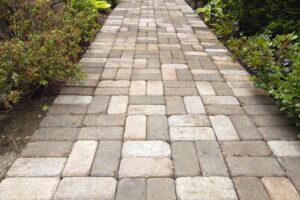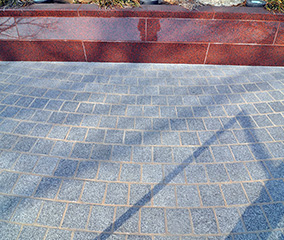
Learn how to prevent and treat the appearance of efflorescence on pavers.
Efflorescence is a common issue for pavers, appearing as a white, chalky residue on the surface. While it’s not harmful to the pavers themselves, it can detract from their aesthetic appeal. Here’s how DelPrete Masonry can help you prevent and remove efflorescence to maintain the beauty of your paved surfaces.
What Is Efflorescence?
Efflorescence occurs when water containing dissolved salts migrates to the surface of pavers. As the water evaporates, the salts are left behind, creating a white residue. This can happen due to the materials used in the pavers or the ground beneath them.
Preventing Efflorescence on Pavers
Use High-Quality Materials
Start with pavers made from high-quality materials, as these are less likely to contain excessive salts. Work with a professional masonry contractor to ensure the best options are used for your project.
Install a Proper Drainage System
Ensure that water drains efficiently away from your paved areas. Poor drainage leads to water retention, which increases the likelihood of efflorescence.
Seal the Pavers
Applying a professional-grade sealant creates a protective barrier, preventing water from penetrating the pavers and bringing salts to the surface.
Lay Pavers Correctly
A proper installation process, including a compacted base and a sand layer, minimizes water infiltration. Professionals will ensure the best techniques are used to prevent efflorescence from forming.
Removing Efflorescence From Pavers
If efflorescence has already appeared, follow these steps to restore your pavers:
Brush and Wash
Start with a dry brush to remove loose residue. Follow this with a light wash using a garden hose and a non-acidic cleaner specifically designed for pavers.
Use Specialized Cleaners
If brushing and washing don’t remove all the residue, use an efflorescence remover. These products are formulated to break down salts without damaging your pavers. Always follow the manufacturer’s instructions for the best results.
Avoid Harsh Chemicals
Acidic cleaners can harm pavers and surrounding plants. Stick to products designed for masonry or consult a professional before using strong cleaning agents.
Reapply Sealant
After cleaning, reapply a sealant to protect the surface and prevent future efflorescence.
Professional Help for Persistent Issues
While minor efflorescence may be managed on your own, persistent or widespread issues may require professional intervention. Masonry experts can assess the underlying causes and implement long-lasting solutions, including improved drainage or advanced cleaning techniques.
Efflorescence on pavers doesn’t have to be a permanent problem. By taking preventive measures and addressing it promptly, you can keep your paved surfaces looking pristine. For expert assistance with efflorescence or any other masonry concerns, contact DelPrete Masonry today.
CONTACT DEL PRETE MASONRY TODAY!
Whether you are ready to start your next masonry project or are still hesitant and have questions, Del Prete Masonry is here to help. We have the experience and expertise to get it right the first time. Questions? Want to visit some of our residential or commercial projects? Ready to set up a consultation? Feel free to give us a call at 410-683-0650 or visit us online. We are happy to serve Baltimore City and County, Harford County, Carroll County, Anne Arundel County, and Howard County. To see examples of our work and to keep up with our new and exciting projects, be sure to follow us on Facebook, Twitter, and Pinterest.
Tags: efflorescence, pavers, stone masonry





























